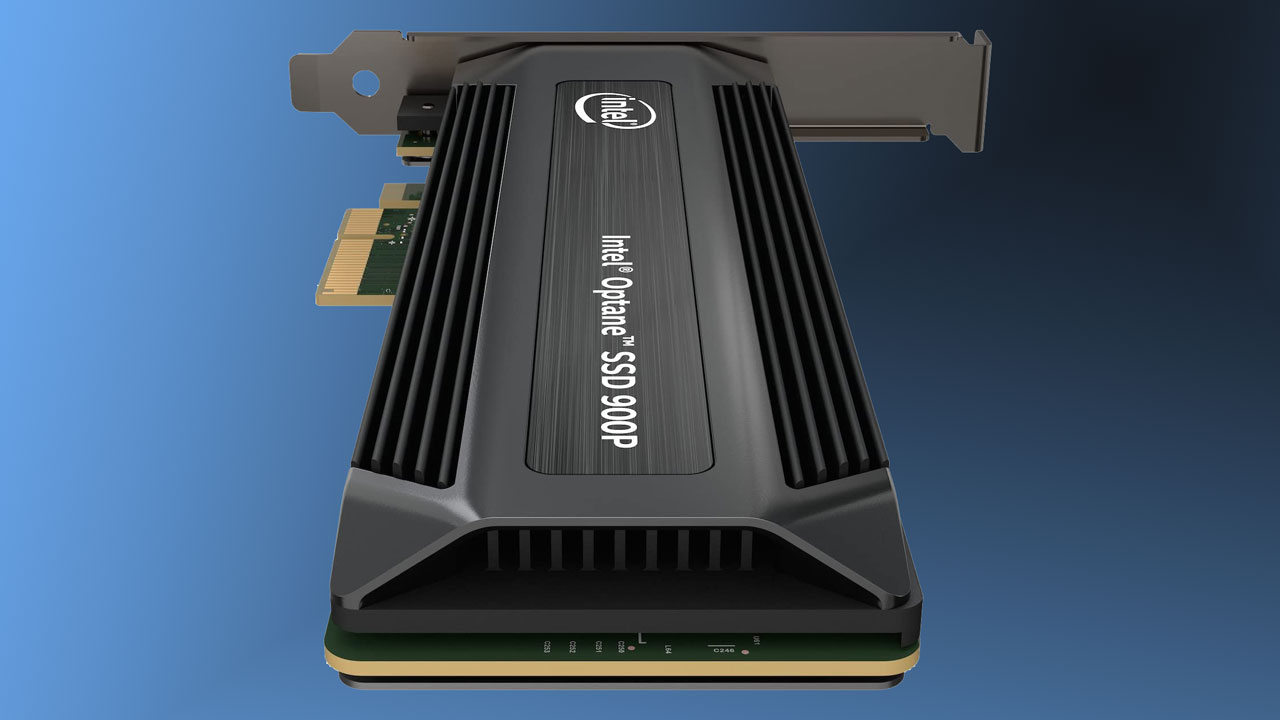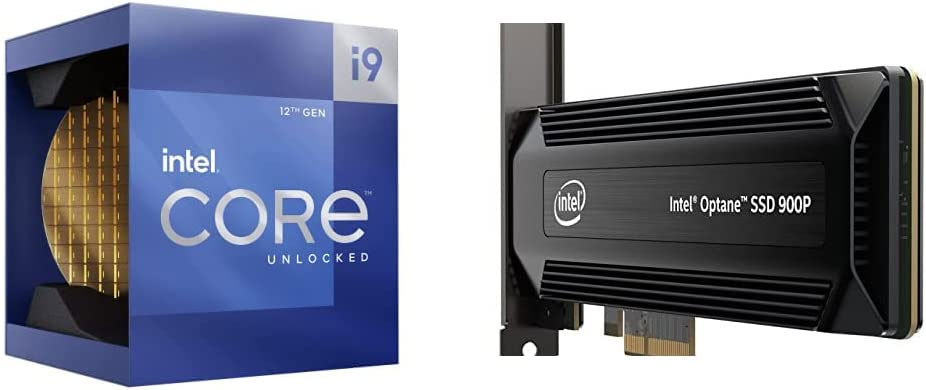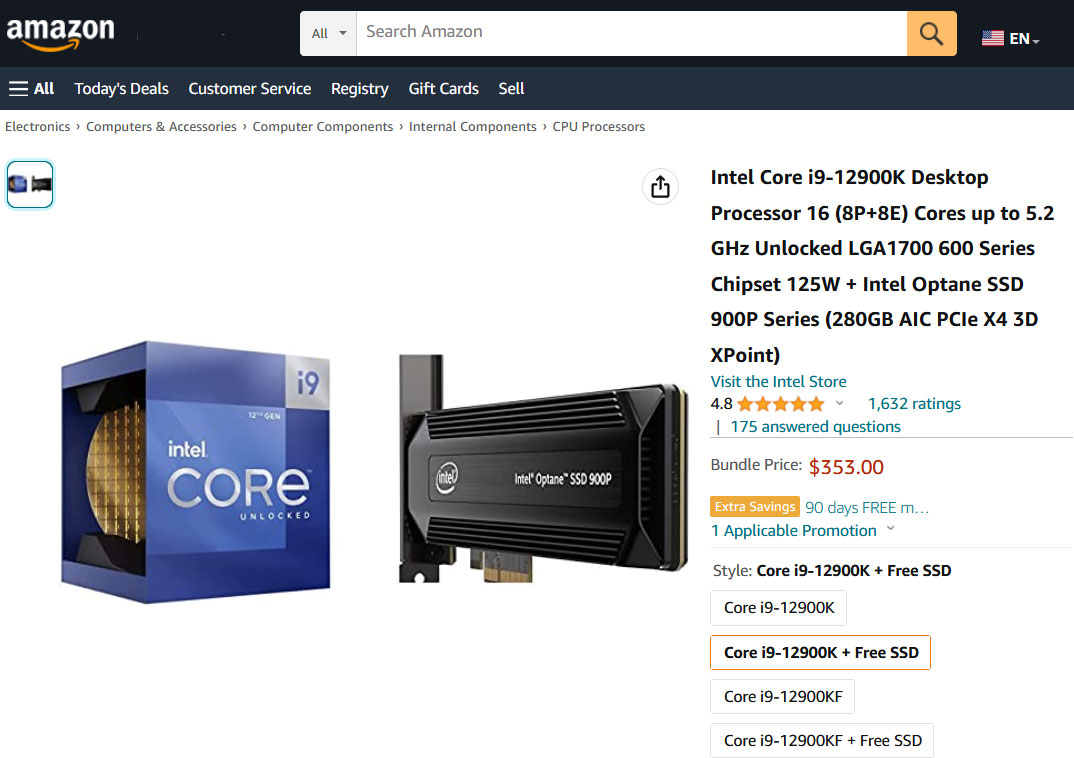Intel Core i9 Buyers Can Add a 280 GB Optane SSD for $1 at Amazon
In other words, you can get the Intel Optane drive for almost free.

Amazon has put together an almost irresistible offer for those who are interested in acquiring one of Intel’s Core i9-12900K or Core i9-12900KF processors. The site is bundling a 280 GB Intel Optane drive with these powerful processors for ‘almost free’ – i.e. the bundle costs just $1 more than the processor on its own.
We published our extensive review of the Intel Core i9-12900K back in July 2022, noting that this processor allowed Intel to retake the gaming crown. A lot of water has passed under the bridge since then, and PC enthusiasts and gamers now have even better choices if money is no object – like the 6 GHz Intel Core i9-13900KS, for example – but they aren’t bundled with almost free Optane SSDs.
The Intel Optane 900P SSD that is part of this Amazon bundle comes as a PCIe add-in card and has a capacity of 280 GB. We reviewed both this 280 GB capacity version and the larger 480 GB capacity card back in 2017. Yes, that is a long time ago, but when it arrived we noted that it was “purportedly the fastest consumer SSD known to mankind.” This drive also came with a price premium due to the speed on offer and the use of the scarce 3D XPoint memory. Intel's Optane 900P SSD offers a sequential transfer speed that are would not be amazing in 2023 (max 2.5 GB/s) but it still achieves PCIe Gen4 NVMe SSD challenging low queue depth performance.
Intel Core i9 12900K plus Intel Optane 900P 280GB for $353
Intel Core i9 12900KF plus Intel Optane 900P 280GB for $399

If this 12th Gen Core i9 CPU and Optane SSD combo works for you, you can grab them right now via Amazon using the links above.
Get Tom's Hardware's best news and in-depth reviews, straight to your inbox.

Mark Tyson is a news editor at Tom's Hardware. He enjoys covering the full breadth of PC tech; from business and semiconductor design to products approaching the edge of reason.
-
Alvar "Miles" Udell The funny thing being that with game sizes being so large, it won't be long before you can only got 1 or 2 games on it.Reply -
helper800 For those of you wondering why this is a good deal, and how fast this drive is for practical use as an OS drive, here is a chart that will not be matched for years to come. Optane is still the fastest low queue depth drives available.Reply -
jeremyj_83 Reply
The QD1 performance for Optane drives is amazing. I use them for the caching drives at work for my all NVMe VMware vSAN array. We have a different all flash (75% NVMe) SDS with 48GB RAM caching and the vSAN is noticeably faster in writes.helper800 said:For those of you wondering why this is a good deal, and how fast this drive is for practical use as an OS drive, here is a chart that will not be matched for years to come. This is still the fastest low queue depth drive available. -
cyrusfox Always sad to see such promising technology relegated to the budget bin. Guess Intel/Amazon are clearing old stock. I am personally waiting on a cheap p5800x :) Happy to even buy that used with how good the endurance is(182k cycles).Reply -
TCA_ChinChin Reply
How would something like this or the P1600X 118GB model fare as a boot drive compared to more modern high end PCIe gen 4 SSDs like WD SN850x, Samsung 990 Pro, or SK Hynix P41? The charts you've linked were to some pretty old SSDs. Was thinking of upgrading my current gen 3 ssd (move the current gen 3 drive to be only storage and buying a new 1 tb ssd for OS + couple of apps). Would optane latency and low queue depth performance translate into snappier Windows experience compared to a modern PCIe gen 4/5 SSD? I wouldn't be getting this bundle deal since I already have a 7600x build, but I've been seeing some deals on optane P1600x and P905 drives and wondering if they're worth it.helper800 said:For those of you wondering why this is a good deal, and how fast this drive is for practical use as an OS drive, here is a chart that will not be matched for years to come. This is still the fastest low queue depth drive available. -
cyrusfox Reply
I have a couple P1600x, and I would say not worth it for the trade offs (Exceptional QD1 performance @ limited size and slow sequentials). Perhaps Optane is slightly snappier, but I found it imperceptible. The hangups of Optane bug me more than the benefit, Optane is always hot with its high idle consumption and total capacity is far too small.TCA_ChinChin said:How would something like this or the P1600X 118GB model fare as a boot drive compared to more modern high end PCIe gen 4 SSDs like WD SN850x, Samsung 990 Pro, or SK Hynix P41?
If you get a killer deal on a larger drive (480gb+) and you want to play with it, by all means go play with this twilight tech. But as a boot drive, I would save the money and get a $20 512gb used NVME drive. 58GB,118GB drives make sense for a cache/specific use case but are too costly and small. -
bit_user Reply
Uh, I rather doubt that. The 900p is first-gen and was much improved upon by the 905p, which is still PCIe 3.0.helper800 said:This is still the fastest low queue depth drive available.
The P5800X is a non-consumer product using newer-gen Optane memory and PCIe 4.0 interface. In terms of QD1 IOPS, it smokes its predecessors. Not available in PCIe form factor, however.
On the same Crystal Disk benchmark, it got 403.6 MB/s.helper800 said:
https://www.servethehome.com/intel-optane-dc-p5800x-800gb-workstation-ssd-review/
I predict you'll only find good deals on them used. Even then, demand could keep prices relatively high, since there's not currently anything quite like them.cyrusfox said:I am personally waiting on a cheap p5800x :) Happy to even buy that used with how good the endurance is(182k cycles).
NAND-backed DRAM should eventually take their place, but those products will likely be CXL-based. -
JarredWaltonGPU I wonder if you can use a 280GB Optane SSD as "Optane Memory" — like the M.2 x2 drives that were 32GB or 16GB. If the Optane Memory software supports the 280GB drive as an option, it might be kind of cool to have a big cache like that.Reply
As for why Optane died, it was just really expensive to make is my understanding. With 3D NAND and QLC improving in performance, plus other controller optimizations to improve QD1 workloads on M.2 SSDs, it just couldn't effectively compete. There are still data center people that run Optane for this reason, but 3D XPoint didn't scale and get significantly better with newer nodes I guess.
